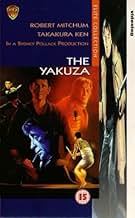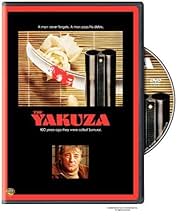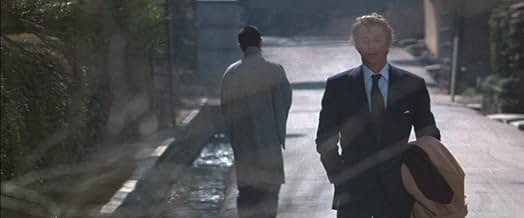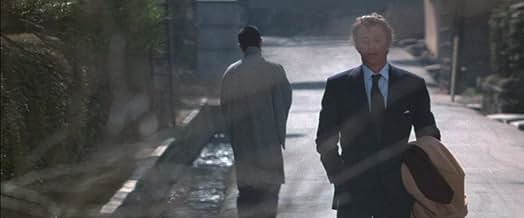ÉVALUATION IMDb
7,2/10
11 k
MA NOTE
Le détective privé américain Harry Kilmer retourne au Japon pour sauver des griffes des Yakuza la fille d'un ami qui a été kidnappée.Le détective privé américain Harry Kilmer retourne au Japon pour sauver des griffes des Yakuza la fille d'un ami qui a été kidnappée.Le détective privé américain Harry Kilmer retourne au Japon pour sauver des griffes des Yakuza la fille d'un ami qui a été kidnappée.
Ken Takakura
- Ken Tanaka
- (as Takakura Ken)
Eiji Okada
- Toshiro Tono
- (as Okada Eiji)
Keiko Kishi
- Eiko Tanaka
- (as Kishi Keiko)
Kyôsuke Machida
- Jiro Kato
- (as Kyosuke Machida)
Eiji Gô
- Shiro 'Spider' Tanaka
- (as Go Eiji)
Histoire
Le saviez-vous
- AnecdotesMartin Scorsese wanted to direct after Les rues chaudes (1973) but the producers wanted Sydney Pollack. Scorsese has gone on record that he would very much have liked to direct the film and was disappointed that he was passed over. However, he got to direct Alice Doesn't Live Here Anymore (1974) instead after being sought out by Ellen Burstyn. Alice Doesn't Live Here Anymore ended up making more than 20 times it's budget and won Burstyn an academy award while The Yakuza became a box office bomb.
- GaffesThe plane that Kilmer is boarding at the end of the film is a Boeing 707, the one shown taking off in the last scene is a 727.
- Autres versionsFor the Spanish Castilian version all the dialogues were dubbed to Spanish, even the Japanese lines.
- ConnexionsFeatured in ...Promises to Keep (1974)
Commentaire en vedette
The strongest point of this film is the writing. It's the first Paul Schrader script ever to be filmed, written with his brother Leonard (who also worked with Paul on Blue Collar & Mishima) and Robert Towne (Chinatown, Marathon Man, Bonnie & Clyde). It seems we have the best of both Schrader's here; Leonard really understands the Japanese culture and Paul is a very cerebral and thematic writer who almost always raises a number of interesting issues.
The film, which is very respectful of it's foreign culture and tries to be as true as possible to it, first and foremost shows the differences between American and Japanese culture. However, there are so many themes in this movie though that it becomes tiresome to list them. The key ones include honor, loyalty, burden, duty, friendship, love, loss, obligation, and the differences between the men of pre and post war Japan.
Although Robert Mitchum was approaching 60 when made the film, he still possessed enough of his trademark grace to be credible enough against much younger men in the action scenes. He always exudes so much casualness and weariness, but his work here shows he was obviously fired up by the material.
The other standout actor is Ken Takakura. He plays an honorable man that everyone respects, but his honor and old ways also often make him intolerable to anyone around him. He hides the deep wounds of his character behind his stone face, but that doesn't in any way prevent him from conveys that he's a miserable man from another age who lives by his code but not for anything. As he's the native that used to be in the Yakuza and Mitchum is the gaijin that doesn't have to follow their honor system (although as the movie progresses, he subscribes to their codes and honor system more and more), Takakura gets to do all the skilled swordplay. His fighting won't thrill those who want a lot of stunts, but is great if you enjoy the psychology and strategy of the craft.
The film is it has a drab, low budget kind of look, mainly as a way to maintain the mood and tone of the piece. Some of the scenes really bring the material to life, particularly through some excellent camera work, but sometimes the look is indifferent and the soundtrack seems to be trying too hard. Aside from staying true to the material and getting strong performances, I wouldn't say that Sydney Pollack has done a great job here. This is not the kind of movie you watch if you are looking for John Woo action though, and for the most part the flaws are overshadowed by the strength of the script and performances. 8/10
The film, which is very respectful of it's foreign culture and tries to be as true as possible to it, first and foremost shows the differences between American and Japanese culture. However, there are so many themes in this movie though that it becomes tiresome to list them. The key ones include honor, loyalty, burden, duty, friendship, love, loss, obligation, and the differences between the men of pre and post war Japan.
Although Robert Mitchum was approaching 60 when made the film, he still possessed enough of his trademark grace to be credible enough against much younger men in the action scenes. He always exudes so much casualness and weariness, but his work here shows he was obviously fired up by the material.
The other standout actor is Ken Takakura. He plays an honorable man that everyone respects, but his honor and old ways also often make him intolerable to anyone around him. He hides the deep wounds of his character behind his stone face, but that doesn't in any way prevent him from conveys that he's a miserable man from another age who lives by his code but not for anything. As he's the native that used to be in the Yakuza and Mitchum is the gaijin that doesn't have to follow their honor system (although as the movie progresses, he subscribes to their codes and honor system more and more), Takakura gets to do all the skilled swordplay. His fighting won't thrill those who want a lot of stunts, but is great if you enjoy the psychology and strategy of the craft.
The film is it has a drab, low budget kind of look, mainly as a way to maintain the mood and tone of the piece. Some of the scenes really bring the material to life, particularly through some excellent camera work, but sometimes the look is indifferent and the soundtrack seems to be trying too hard. Aside from staying true to the material and getting strong performances, I wouldn't say that Sydney Pollack has done a great job here. This is not the kind of movie you watch if you are looking for John Woo action though, and for the most part the flaws are overshadowed by the strength of the script and performances. 8/10
- rbmoviereviewsdotcom
- 2 mai 2001
- Lien permanent
Meilleurs choix
Connectez-vous pour évaluer et surveiller les recommandations personnalisées
- How long is The Yakuza?Propulsé par Alexa
Détails
Box-office
- Budget
- 5 000 000 $ US (estimation)
Contribuer à cette page
Suggérer une modification ou ajouter du contenu manquant

Lacune principale
By what name was The Yakuza (1974) officially released in India in English?
Répondre





























